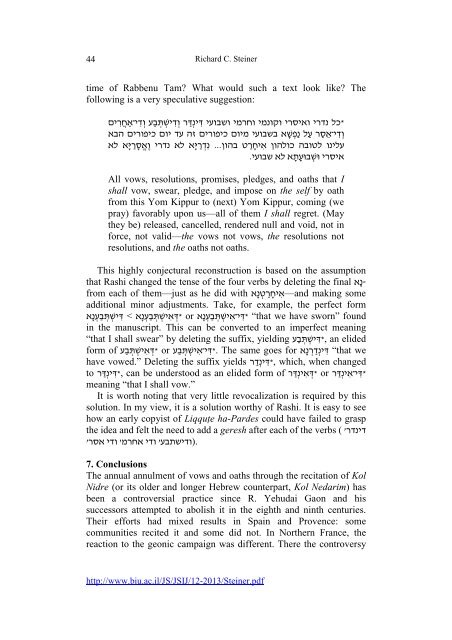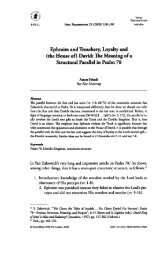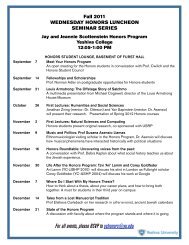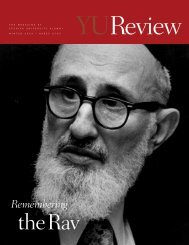Richard Steiner, Kol Nidre - Yeshiva University Blogs
Richard Steiner, Kol Nidre - Yeshiva University Blogs
Richard Steiner, Kol Nidre - Yeshiva University Blogs
You also want an ePaper? Increase the reach of your titles
YUMPU automatically turns print PDFs into web optimized ePapers that Google loves.
44<strong>Richard</strong> C. <strong>Steiner</strong>time of Rabbenu Tam? What would such a text look like? Thefollowing is a very speculative suggestion:*כל נדרי ואיסרי וקונמי וחרמי ושבועי דִּ ינְ דַּ ר וְ דִ ישְׁ תְּ בַ ע וְ דִ י־אַחֲ רִ יםוְ דִ י־אֵ סַ ר עַ ל נַפְ שָׁ א בשבועי מיום כיפורים זה עד יום כיפורים הבאעלינו לטובה כולהון אִ יחָ רַ ט בהון... נִ דְ רַ יָּא לא נדרי וֶ אֱ סָ רַ יָּא לאאיסרי וּשְׁ בוּעָ תָ א לא שבועי.All vows, resolutions, promises, pledges, and oaths that Ishall vow, swear, pledge, and impose on the self by oathfrom this Yom Kippur to (next) Yom Kippur, coming (wepray) favorably upon us—all of them I shall regret. (Maythey be) released, cancelled, rendered null and void, not inforce, not valid—the vows not vows, the resolutions notresolutions, and the oaths not oaths.This highly conjectural reconstruction is based on the assumptionthat Rashi changed the tense of the four verbs by deleting the final -from each of them—just as he did with יחָ רַ טְ נָא and—אִ making someadditional minor adjustments. Take, for example, the perfect formנָא“that we have sworn” found * דִּ י־אִ ישְׁ תְּ בַ עְ נָא * or דְּ אִ ישְׁ תְּ בַ עְ נָא < דִּ י שְׁ תְּ בַ עְ נָאin the manuscript. This can be converted to an imperfect meaning“that I shall swear” by deleting the suffix, yielding *form of *. The same goes for דִּ ינְ דַ רְ נָא “that wehave vowed.” Deleting the suffix yields דִּ ינְ דַ ר *, which, when changedto דִּ ינְ דַּ ר *, can be understood as an elided form of *meaning “that I shall vow.”It is worth noting that very little revocalization is required by thissolution. In my view, it is a solution worthy of Rashi. It is easy to seehow an early copyist of Liqquṭe ha-Pardes could have failed to grasp, an elided דִּ ישְׁ תְּ בַ ע* דִּ י־אִ ינְדַּ ר or דְּ אִ ינְ דַּ ר* דִּ י־אִ ישְׁ תְּ בַ ע or דְּ אִ ישְׁ תְּ בַ עדינדר ' ( verbs the idea and felt the need to add a geresh after each of the' ).ודישתבע' ודי אחרמ' ודי אסר7. ConclusionsThe annual annulment of vows and oaths through the recitation of <strong>Kol</strong><strong>Nidre</strong> (or its older and longer Hebrew counterpart, <strong>Kol</strong> Nedarim) hasbeen a controversial practice since R. Yehudai Gaon and hissuccessors attempted to abolish it in the eighth and ninth centuries.Their efforts had mixed results in Spain and Provence: somecommunities recited it and some did not. In Northern France, thereaction to the geonic campaign was different. There the controversyhttp://www.biu.ac.il/JS/JSIJ/12-2013/<strong>Steiner</strong>.pdf







